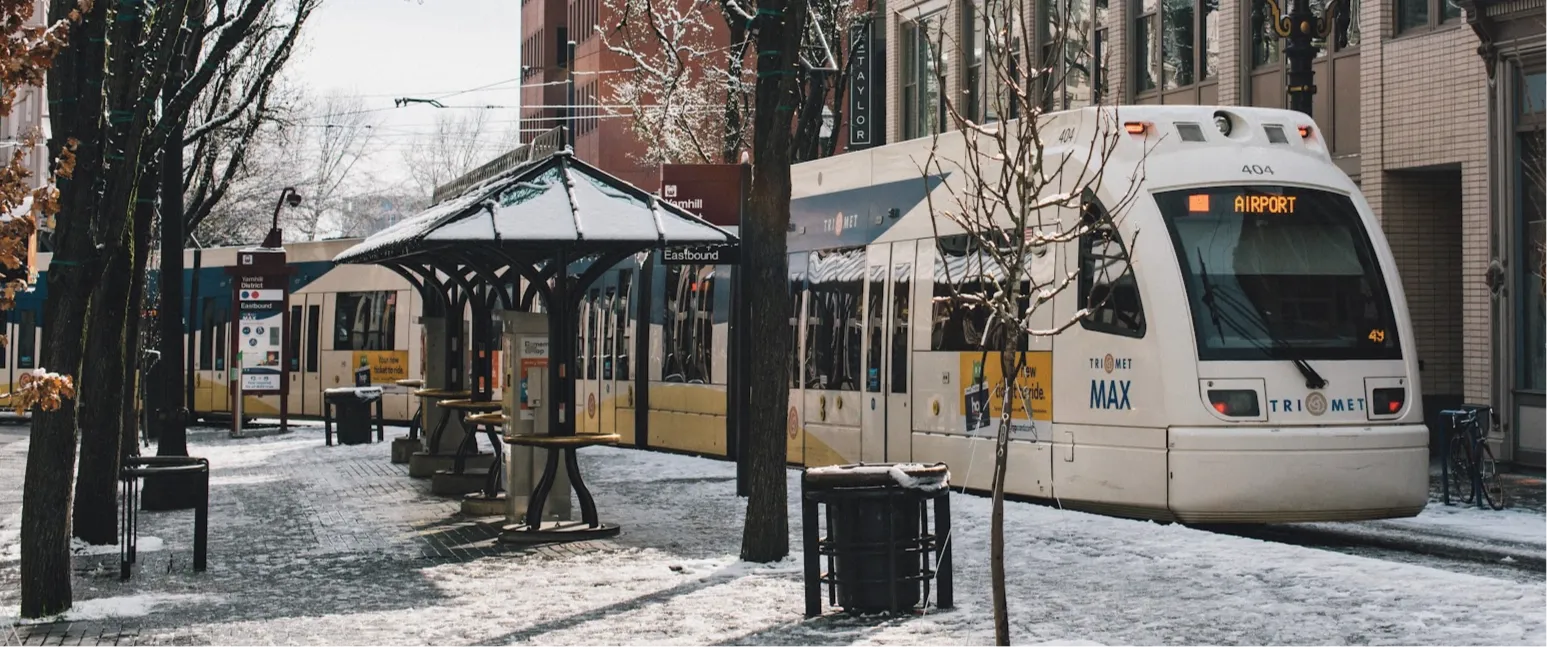Nancy Young-Oliver, CPA, CPFO, CFE, CISA, Chief Financial Officer
TriMet
TriMet
Learn about our environmental, social, and governance program, and how we bring those values to life with green and sustainable projects.
Add this issuer to your watchlist to get alerts about important updates.
Learn about our environmental, social, and governance program, and how we bring those values to life with green and sustainable projects.
TriMet has held a long-standing commitment to implementing climate solutions, extending beyond providing environmentally friendly transit service. Our early commitment to transit-oriented development and utilizing a federal policy to redirect highway funds to transit and roadway projects ultimately helped spur more walkable and bikeable cities in our region. TriMet also pioneered the development and use of NASCAR-type technology to increase bus operating efficiency, and later in 2006, TriMet became the first transit system in the nation to power buses with cleaner 5% biodiesel fuel.
TriMet has consistently taken steps to increase efficiencies, reduce fossil fuel oil and gas consumption, and we’re now actively reducing our carbon footprint. All TriMet-owned facilities and our entire MAX light rail system are now powered by 100% renewable electricity. And, as of December 2021, our bus fleet runs on a cleaner burning, renewable diesel from plant-based materials—known as R99.
TriMet's switch to 100% renewable electricity in June 2021 and renewable diesel for fixed-route buses in December 2021 and for diesel-engine LIFT and WES following in 2022 got TriMet beyond our first benchmark goal, and is estimated to have cut the carbon dioxide-equivalent emissions produced by the agency by nearly 70%.
TriMet has identified key strategies to achieve our climate goals and benchmarks:
TriMet issued its first sustainability bonds in October 2021 to fund projects that bring environmental and/or social benefits. The sustainability bonds proved so popular with investors that there was more demand than supply. The bond sales generated $200 million in new money to fund capital projects, including the MAX Red Line Extension and renovations at the Powell Operating Facility to prepare for the return of articulated 60-foot buses and TriMet's growing electric bus fleet.
TriMet established a Clean Fuel Credits program in 2020 as part of Oregon’s Department of Environmental Quality Clean Fuels Program. The program is designed to reduce the carbon emissions produced by the state’s transportation fuels by 10% by 2025.
Climate Resiliency Efforts:
TriMet has undertaken many efforts over time to be more resilient to climate change and the extreme weather it can produce. Some recent efforts at TriMet include:

The following information is derived mainly from our Moody's 2023 credit rating update, with complementary information added by TriMet.
The US mass transit sector overall has low exposure to environmental risks because mass transit is an energy-efficient mode of transportation that will see increased ridership as governmental policies and public preference shift from carbon inefficient travel.
However, exposure to natural disasters and climate change is somewhat more elevated as mass transit and commuter rail issuers rely on infrastructure that is susceptible to earthquakes and wind and water damage. Excessive heat and cold can stress the system and effect the overhead wires and tracks. TriMet has multiple projects included in its capital plan that addresses these concerns and allows the system to run more reliably and efficiently during times of extreme weather in the region.
These considerations are also linked to those of the municipality where TriMet is centered, in this case Portland, OR (Aaa stable). Portland's overall exposure to environmental risks is low compared to peer local governments nationwide.
The mass transit sector is moderately exposed to social risk given its labor intensive and customer-oriented operations. Ridership levels are susceptible to public perception regarding health and safety, and the effectiveness and adequacy of operating performance. Deterioration in public opinion can lead directly to operating revenue declines that increase the need for politically sensitive fare and tax increases. This is balanced by TriMet's growing regional wealth that will make taxes more affordable. TriMet approved a fare hike in May 2023, the first in 10 years, that will become effective Jan. 1, 2024.
These considerations are also linked to those of the municipality where TriMet is centered, in this case Portland, OR (Aaa stable). Social considerations are generally positive for Portland, including above-average wealth and income and a growing population that is younger than state and national averages.
TriMet is a municipal corporation established under state law. TriMet policy is set by a seven-member board. Members are volunteers that each represent a geographical district. Members are appointed to four-year terms by the governor and confirmed by state Senate. TriMet has a long term track record of delivering large capital projects on time and on budget.
TriMet's board and management also pay close attention to cybersecurity risks. To reduce and mitigate the risk of business operations impact and/or damage from cybersecurity incidents, TriMet has invested in multiple forms of cybersecurity and operational safeguards, and regularly reviews and revises its policies and practices in order to support, maintain, and secure critical infrastructure and data systems, manage risk, and improve cybersecurity event detection and remediation. In order to offset some of the potential financial costs and risks associated with a breach, TriMet also maintains a Cyber-Liability insurance policy.